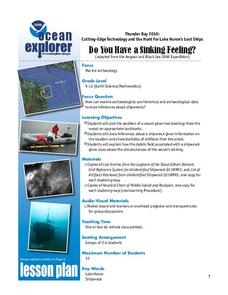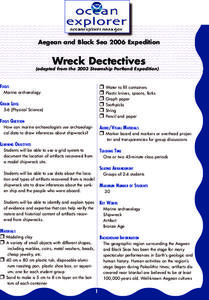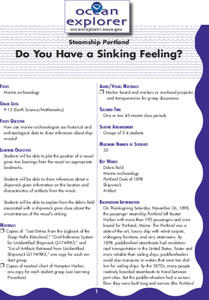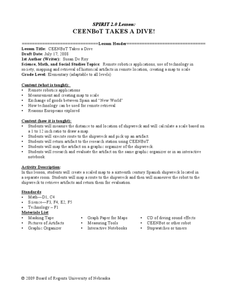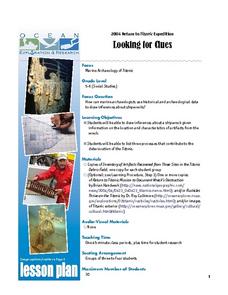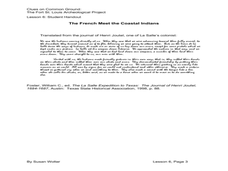Curated OER
National Marine Sanctuaries Shipwrecks
Junior oceanographers access the Channel Islands National Marine Sanctuary Shipwreck Database and plot the locations of several shipwrecks. Shipwrecks are always an enthralling subject and this activity allows your learners to act as...
Curated OER
Shipwreck Mystery
Students draw inferences about a shipwreck. In this marine archaeologist lesson, students examine historical and archaeological data to draw inferences about the age and identity of shipwrecks.
Curated OER
Shipwreck Mystery
Students study web pages on a shipwreck then locate where this took place on a map. For this marine archaeologist lesson students examine what clues archaeologists use to find the location of a shipwreck and what they might find.
Curated OER
Wreck Detectives
Students investigate shipwrecks. In this marine archaeology lesson ,students collect data and make inferences about the causes of shipwrecks. Students work in groups to create their own model of a shipwreck using clay. Students then...
Curated OER
Ancient Greece
Sixth graders examine the research that archaeologists have done on a Late Bronze Age shipwreck in order to work out the extent of trade in the Eastern Mediterranean during this period, with emphasis on the involvement of the Mycenaeans...
Curated OER
Take Only Photos and Leave Only Bubbles: Learn About American History from a Sunken Spanish Galleon
Young scholars simulate the research process of investigating a shipwreck. In small groups, they conduct Internet research, and develop and write a proposal for excavation of the archaeological site.
Curated OER
Do You Have a Sinking Feeling?
Students explore how marine archaeologists use data to draw inferences about shipwrecks. In this marine archeology lesson students plot the position of a vessel, draw inferences about a shipwreck and explain the possible circumstances...
Curated OER
Looking for Clues
Students infer the cause of a shipwreck based upon information about artifacts found in the wreck. In this marine archeology lesson, students use an inventory list to infer the cause of a shipwreck. Students discuss the maritime...
Curated OER
Wreck Detectives
Junior archaeologists examine types of artifacts from the Bronze Age on the internet. In collaborative groups, they create a story about a ship from this period and then construct a model of the ocean floor after their ship has sunk....
Curated OER
The Uluburun Shipwreck Project: Interconnections through Trade in the Late Bronze Age Mediterranean World
Ninth graders examine causes and effects of the Uluburun shipwreck. In groups, they develop their own ways to categorize the artifacts found on the ship and decide on the research questions they are going to focus on. They use the...
Ocean Explorer
Looking for Clues
Upper graders become "shipwreck detectives" by studying the debris field from a shipwreck in the Aegean Sea which took place in the 700s. A website is accessed that gives specific information about the debris field, and pairs of...
Curated OER
Investigating History with Kidd Gloves
Students act as historical archeologists and use their analytical skills to deduce, from lists of items related to historic figures, accurate details about the lives of those people.
Curated OER
Do You Have A Sinking Feeling?
Students plot the positions of vessels given bearings in the form of landmarks. They explain how the debris field can help solve the mystery in how the ship sunk.
Curated OER
Do You Have a Sinking Feeling
Students determine how marine archaeologists use historical and archaeological data to draw inferences about shipwrecks. Students plot the position of a shipwrecked vessel, and draw inferences about the shipwreck from artifacts that have...
Curated OER
Exploring Explorations-Ocean Exploration
Students learn about Earth's deep ocean discoveries and their benefits. In this ocean exploration lesson, students review previous explorations of the Earth's deep oceans and learn about the discoveries of the past.
Curated OER
Preservation Through Education: Activities and Programs
Students participate in different activities to help them discover the need for preservation. They pretend they are underwater archaeologists and create a sketch of a mock shipwreck in their classroom. They label the parts of the ship as...
Curated OER
CEENBoT Takes a Dive
Learners create a map to scale using technology. In this algebra lesson, students navigate through a shipwreck to perform rescues. They use he CEENBoT program to perform the different tasks.
Curated OER
Titanic: Looking for Clues
Students make inferences about a shipwreck based on the location of artifacts. They role play as marine archaeologists and list three processes that contribute to the deterioration of the Titanic.
Curated OER
Lesson 6: Examining Events from Different Perspectives Friend or Foe?
Fifth graders sequence events of European exploration and colonization by creating timelines. They define the differences between primary and secondary sources. They discuss claims to Texas land in the 17th Century.
Curated OER
United States - Japanese Relations In Post World War II Era
Ninth graders explore the relationship between the United States and Japan. In groups, classmates research the treatment of Koreans and Americans as prisoners of war. Pupils examine the effect of politics and agreements during the war....








